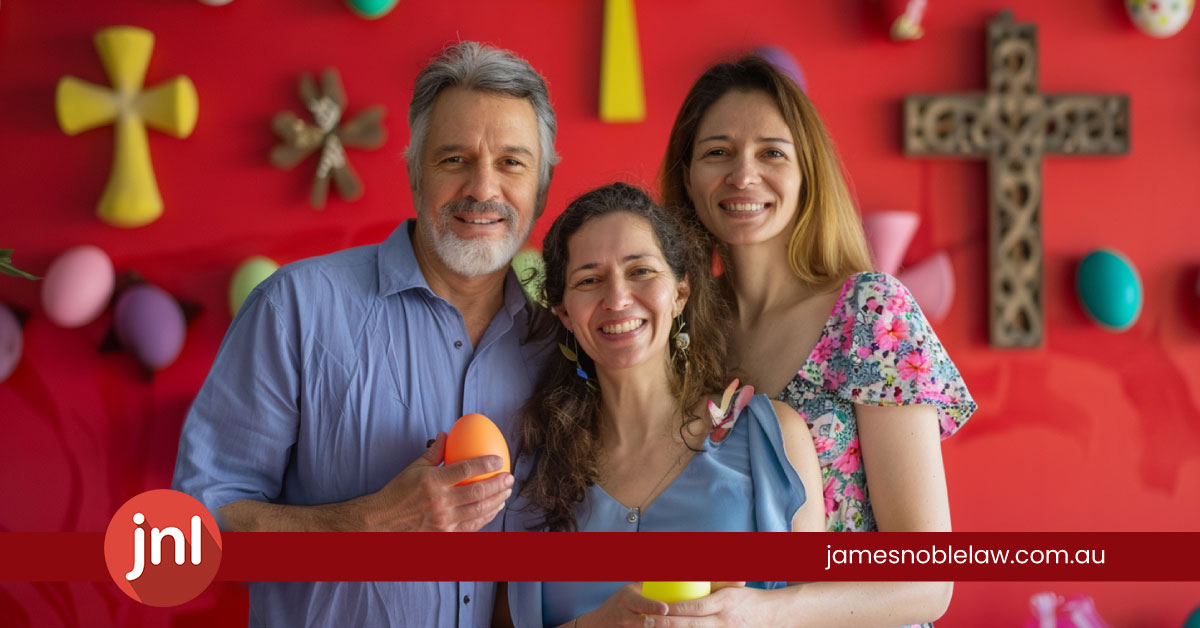
Easter Parenting Arrangements in QLD
Easter is a time of religious significance for many families, but for separated or divorced parents with different religious beliefs, it can be a source of tension when it comes to parenting arrangements. In Queensland, where cultural and religious diversity is embraced, it is important for parents to navigate these differences respectfully and in the best interests of their children.

One of the key challenges parents face is deciding how to incorporate religious beliefs and practices into Easter parenting arrangements. For parents who share the same religious beliefs, this may involve attending religious services or participating in religious rituals together.
However, when parents have different beliefs, finding a balance can be more complicated.
Communication is crucial in these situations. Parents should discuss their expectations and concerns openly and respectfully, focusing on the well-being of their children. It is important to listen to each other’s perspectives and try to find common ground, even if that means making compromises.
Flexibility is also key. Parents may need to be willing to adjust their parenting arrangements to accommodate each other’s religious beliefs and practices. This could involve alternating Easter celebrations between parents or finding ways to incorporate both parents’ beliefs into the children’s Easter experience.
Seeking the advice of a family counsellor or mediator can also be helpful. A neutral third party can facilitate discussions and help parents find solutions that work for everyone involved. Family counsellors can also provide strategies for co-parenting effectively and managing conflict around religious differences.
Arrangements for religious traditions can also be incorporated into a parenting plan or court orders. Incorporating religious beliefs into a parenting plan or court orders requires thoughtful consideration and a focus on the best interests of the child.
Parents can include provisions in their parenting plan that outline how religious holidays and practices will be celebrated, such as attending church services or participating in religious rituals. It is important for parents to be flexible and respectful of each other’s beliefs, ensuring that the child has the opportunity to learn about and experience both parents’ religious traditions.
In court orders, judges may consider the religious beliefs of the parents and the child when making decisions about parenting arrangements, aiming to balance the child’s exposure to and understanding of both parents’ religions.
Ultimately, the goal should be to create a parenting arrangement that respects both parents’ religious beliefs and allows children to experience and learn about different faiths. By approaching these discussions with respect, open-mindedness, and a focus on the well-being of their children, parents in Queensland can navigate religious differences during Easter and create meaningful and inclusive Easter celebrations for their families.
Need help?
Contact the Brisbane or Cairns family lawyers team at James Noble Law today for a FREE, no-obligation 20-minute consultation. To schedule an appointment with one of our Qualified and experienced Family lawyers in Brisbane.
Find us on Google Maps:
Find trusted Brisbane family lawyers on Google Maps or get in touch with us directly.
Helpful Family Law Documents & Guides
- A Guide to Children Negotiation and Family Law
- A Guide to Property & Family Law Act Paper
- A Guide to Alternative Dispute Resolutions
- A Guide to Preparing for the unthinkable
- A Guide to Collaborative Practice Paper
- A Guide to Separation in Family Law
- A Guide to Family Law Property
- A Guide to Dispute Resolution
- A-Z Collaborative Law eBook
- A Guide to Separation
- A Guide to Children
- Arbitration eBook
- Family law eBook


